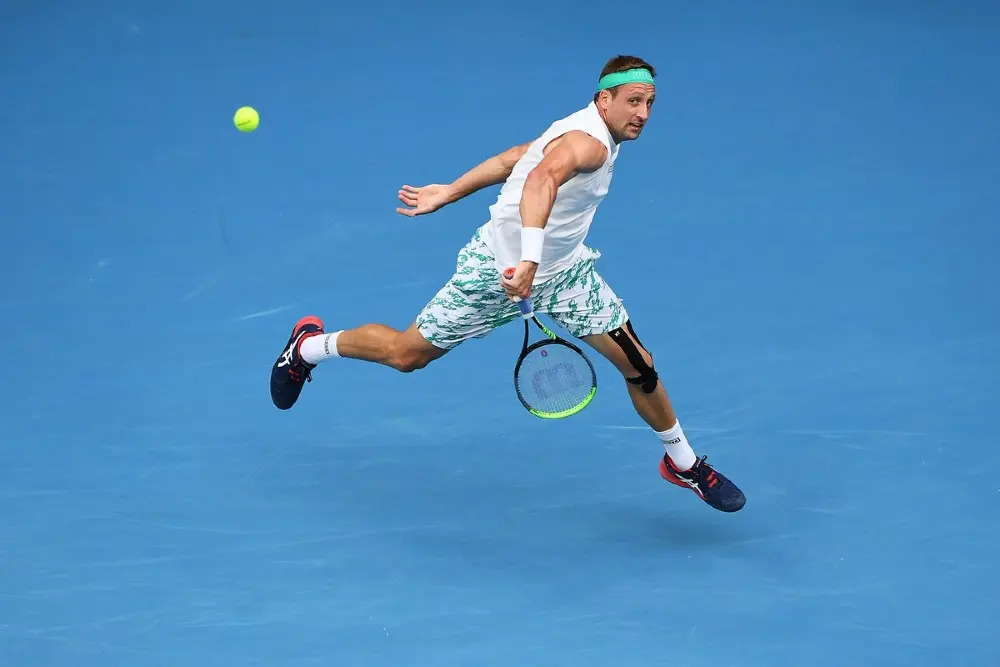There was little celebration from Elina Svitolina after she reached the quarter-finals of Wimbledon on a grave day for her home country.
The world No.21 eased to a 6-2, 6-1, win over China’s Wang Xinyu without dropping serve, reaching the last eight of the tournament for the third time in her career. It is a huge boost for the 29-year-old who later admitted she didn’t feel like playing in the wake of a new attack against Ukraine.
A Russian missile attack struck the country in daylight on Monday which resulted in the deaths of at least 36 people and caused significant damage to the main children’s hospital in Kyiv, according to officials. Reuters News Agency says they have a video showing a missile falling from the sky towards the children’s hospital followed by a large explosion.
“It’s an incredibly sad day today for all Ukrainians. It was really difficult for me to be here (at Wimbledon) in a way and do anything. I just wanted to be in my room, just be there with my emotions, with everything,” said Svitolina.
“Today was one of the days where it was even more difficult because the missile landed on the hospital, the kids’ hospital. Straightaway you see the images and everything that happened there. So many kids lost their lives.”
Svitolina took to the court wearing a black ribbon on her t-shirt in respect to those affected. The gesture was approved by The All England Club which usually has in place a strict all-white policy when it comes to attire. Throughout the war in Ukraine, she has spoken numerous times about the conflict and is an ambassador her the United24 fundraising platform, which was set up by President Volodymyr Zelenskyy.
Evgeniy Zukin, who is the executive director of the Ukrainian Tennis Federation (UTF), spoke to Ubitennis following his compatriot’s latest win at SW19. He stresses the significance of Svitolina and her peers to continue speaking out about the war.
“It is important for Ukrainians to keep informing the world of the atrocities that are now happening in Ukraine,” said Zukin.
“We know the public in the West is tired of bad news. Only disasters like today when many children were killed bring attention back to Ukraine. But unfortunately, people are dying every day and no less than today.”
Zukin’s words are also echoed by tennis journalist Sergey Kontorchik, who is the founder of Великий теніс України which is known in English as BTU. He is based in Dnipro, a city located in the centre of the Dnipropetrovsk Region which borders Donetsk. As somebody living in the conflict zone, Kontorchik is frustrated by the promotion of Russian and Belarussian athletes in the media whilst his athletes suffer.
“No one is interested in the mental state of Ukranian players. You saw how hard it was for Svitolina after the match today,” he told Ubitennis from Dnipro on Monday afternoon.
“For Ukrainians, it is hard and it hurts. Our players receive negative criticism for not shaking hands with representatives of these countries. We are pushed to the background, far away, so as to not bring up an uncomfortable topic, the war, which continues to destroy our country.
“It is important to us (Ukrainians) when players talk and remind the world about the war, that Ukraine is still alive and continues to fight for independence.
“It’s clear many people have forgotten.”
Wimbledon had previously banned Russian and Belarussian players from competing in the tournament in 2022 amid concerns that those governments could use the event as propaganda. The move prompted backlash from the governing bodies who removed the allocation of rankings points that year. The ban was lifted in 2023.
“I would prefer that (the ban to still be in place) but it is how it is now,” said Svitolina. “I cannot change. We tried every possible way to talk with many organizations.
“For now I just want to raise awareness, to raise funds for people in need, to raise support for the kids through my foundation, through United24. So many ways we can help people and not only focus on the things we cannot control.”
The hope for Svitolina is that her tennis is providing comfort to those back home. Although dealing with her emotions due to the war is tough.
“I think for many Ukrainians they will share this feeling with me. We feel guilt that we feel happy or that we feel good. Not only because I’m in the quarterfinal of the Grand Slam but in everything,” she explained.
“Like you go on holidays, you feel guilty because you’re not in Ukraine. Many people cannot leave the country. Many people are at war. Many people are fighting, and defending our front lines.
“I think we’ve been living with this feeling for over two years. I mean, it’s nothing new. But yes, of course, it’s not a pleasant feeling to have.”
On court, things are going well for Svitolina. She has dropped only one set in the tournament so far, which was against Magda Linette in the first round.
“She showed in the last year that she knows how to play on grass,” Zukin told Ubitennis about Svitolina.
“After beating Ons Jabeur (in the third round) she felt confident and played flawlessly today.”
Svitolina will next play Elina Rybakina.



 Hot Topics3 days ago
Hot Topics3 days ago
 Latest news3 days ago
Latest news3 days ago
 Hot Topics2 days ago
Hot Topics2 days ago
 Hot Topics3 days ago
Hot Topics3 days ago
 Focus2 days ago
Focus2 days ago
 Focus2 days ago
Focus2 days ago
 Focus2 days ago
Focus2 days ago
 Hot Topics2 days ago
Hot Topics2 days ago


























